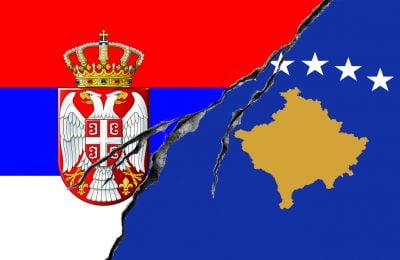Germany’s Kosovo Policy Shift. Implications for Serbia and the EU

The debate in the German Bundestag on the extension of the mandate of German Kosovo Force (KFOR) soldiers turned into a criticism of long-time Chancellor Angela Merkel and raised speculation that Berlin might adopt a different position on Kosovo. The opposition reminded Merkel that Germany participated in the war in Kosovo, and that KFOR, a multinational NATO “peacekeeping force” was on the same side as the terrorist “Kosovo Liberation Army.” Is Germany preparing for a big turn on the issue of Kosovo?
The topic was raised by the right-wing Alternative for Germany (AfD) MP Anton Frizen and was surprisingly joined by Alexander Neu of the leftists Die Linke. They highlighted that the idea of solving the Kosovo problem through the exchange of territories was supported by the U.S.
It is significant when the most right political party in the Bundestag is finding common ground with the most left political party, as they can coordinate pressures that could change Berlin’s course on Kosovo. Any change in major foreign policy in Germany ultimately influences the EU’s position. The main challenge is that the ruling coalition of the Christian Democratic Union of Germany (CDU) and the Christian Social Union in Bavaria (CSU) is dominant in the German parliament and they rule Germany in an alliance with the Social Democratic Party of Germany. The AfD is the third strongest party in the Bundestag, and Dei Linke is in fifth place.
Merkel, who has a firm position on Kosovo will soon leave office and it is not yet known who will succeed her, and whether they want to change course on this issue. However, the last debate in Germany is an indicator that there has been a reconsideration, which is even being reflected on the global level, of policy on Kosovo. It is obvious that the failure of the project for an independent Kosovo from Serbia, considered the cultural, historical and religious heartland of the Serbs, shows that political public opinion is not only changing in the U.S., but also in Europe. It also shows how problematic this kind of Kosovo is for those who created it. We now have new actors and forces on the German political scene and in the Bundestag, who are critical of Germany’s previous behavior on the issue of Kosovo and demand reconsideration.
Since Kosovo made its illegal declaration of independence in 2008, it has become a ‘smugglers paradise’ for heroin and a hub for human trafficking, organ harvesting and arms trafficking, all under the watchful eye of KFOR. As of today, 15 countries have withdrawn their recognition of Kosovo as an independent country, meaning only 50% of countries in the world recognize the illegal entity.
This event in Germany is extremely important because it is a leading country that stands on a firm position that nothing will change on the Kosovo issue and pushes for Serbia to recognize the independence of Kosovo with the promise of EU membership. This debate in Germany now will certainly have an impact on Berlin’s policy, but not immediately – at least not while this ruling coalition, led by Merkel, is in power. Germany will take over the presidency of the Council of the European Union in July for a 6-month period and we can see how Merkel might navigate Kosovo considering the political climate is changing.
What is worth noting however is that Germany’s leftist parties, that are usually anti-American, are now closer to Washington’s proposals for Kosovo rather than Berlin’s. But criticism of the government from both the left and the right will raise eyebrows when the Bundestag debates whether the extension of German soldiers in KFOR is necessary.
Ruling in Berlin are the parties that were in power during the 1990’s and were direct participants in everything that happened in Kosovo and supported the destruction of Yugoslavia. Therefore, it is logical that they have not given up their position. But pressure from the fringes of German politics, but who still wield massive influence, will certainly force a debate in Berlin about changing policy on Kosovo, especially as the breakaway province continues to lose legitimacy globally.
*
Note to readers: please click the share buttons above or below. Forward this article to your email lists. Crosspost on your blog site, internet forums. etc.
This article was originally published on InfoBrics.
Paul Antonopoulos is an independent geopolitical analyst.

